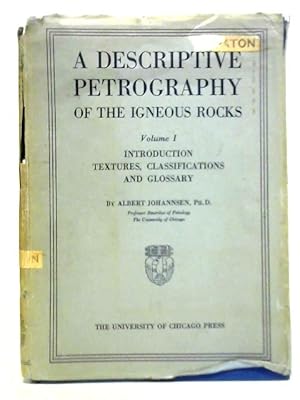A Descriptive Petrography of the Igneous Rocks - Volume I: Introduction, Textures, Classifications And Glossary
Albert Johannsen
Librería:
World of Rare Books, Goring-by-Sea, SXW, Reino Unido
Calificación del vendedor: 5 de 5 estrellas
![]()
Vendedor de AbeBooks desde 6 de abril de 2009
Descripción
Descripción:
1950. Fourth Impression. 318 pages. Blue dust jacket over blue cloth. Contains black and white illustrations throughout. Volume I. Pages are moderately tanned and foxed throughout. Previous owner's inscription to front free endpaper. Thumb-marking present. Light creasing to gutter. Boards have moderate edge-wear with bumping to corners and rubbing to surfaces. Soft crushing to spine ends. Noticeable tanning to spine and edges. Water staining to spine. White marks overall. Textblock is shaky. Unclipped jacket has heavy edgewear with notable areas of loss, heavy tears, chips and, creasing. Visible tanning to spine. Noticeable rubbing to surfaces. Scuffing to edges. Marks overall. N° de ref. del artículo 1661363640GEO
Detalles bibliográficos
Título: A Descriptive Petrography of the Igneous ...
Editorial: The University of Chicago Press
Año de publicación: 1950
Encuadernación: Encuadernación de tapa dura
Condición: Fair
Condición de la sobrecubierta: Sobrecubierta no Incluida
Los mejores resultados en AbeBooks
A Descriptive Petrography of the Igneous Rocks Volume I Introduction, Textures, Classifications & Glossary Second Edition.
Librería: Harry Alter, Sylva, NC, Estados Unidos de America
hardcover, Condición: poor, University of Chicago Press, c.1955, 5th.impression, 8vo., cloth, 318pp., photos., spine halfway detached along rear hinge, a bit shaken, contents ok, $. Nº de ref. del artículo: 88115
Cantidad disponible: 1 disponibles
A Descriptive Petrography of the Igneous Rocks. Volume I. Introduction, Textures Classifications and Glossary. Second (2nd) Edition.
Librería: Eryops Books, Stephenville, TX, Estados Unidos de America
Hardcover. Condición: Very Good. ORIGINAL PUBLICATION; HARDCOVER; this is NOT ex-library; minor shelfwear; light browning of leaves; o/w in very good condition. Book. Nº de ref. del artículo: 039123
Cantidad disponible: 1 disponibles
A Descriptive Petrography of the Igneous Rocks Volume I Introduction, Textures, Classifications and Glossary
Librería: Chequamegon Books, Washburn, WI, Estados Unidos de America
Hardcover. Second. 318pp. 6 3/4 x 10" Blue cloth boards with gilt text. Very Good Boards are lightly worn with bumping at corners; spine edges are bumped and rubbed; previous owner's name inked on front pastedown and first page. Nº de ref. del artículo: 115648
Cantidad disponible: 1 disponibles
A Descriptive Petrography of the Igneous Rocks Volume I Introduction, Textures, Classifications, and Glossary
Librería: Adagio Books, Longmont, CO, Estados Unidos de America
Hardcover. Condición: Good. No Jacket. Second Edition Fourth Printing. In good, clean condition with previous owner's name inked inside front cover. Otherwise unmarked. No dust jacket. Minor shelfwear. Textblock tight, square and lightly tanning. Describes the textures and structures of rocks with a summary of the various classification. Approximately 800 terms are defined and cross-referenced. 342 pages, 145 illustrations. Size: 7 x 9 1/2. Nº de ref. del artículo: 8712-30
Cantidad disponible: 1 disponibles
A Descriptive Petrography of the Igneous Rocks. Volume I. Introduction, Textures, Classifications and Glossary
Librería: Arroyo Seco Books, Pasadena, Member IOBA, Pasadena, CA, Estados Unidos de America
Blue Cloth. Condición: Near Fine. Estado de la sobrecubierta: Very Good DJ. Plates, Drawings, Tables Ilustrador. First Edition, First Printing. 267 Pp. Blue Cloth. First Edition. Ownership Signature Of Professor Heinz Loewenstam [1912-1993]. A Near Fine Example Of The Book, In A Dj Which Is Price-Clipped, Spine Sunned, 1 1/4" V-Chip At Top Of Front Panel Not Affecting Any Lettering, And A Long Tear Down The Front Panel, Entirely Closed And Without Loss. "It Was Lowenstam'S 1961 Discovery Of Biochemically-Precipitated Magnetite (Fe3o4) As A Capping Material In The Radula (Tongue Plate) Teeth Of Chitons (Marine Mollusks) That Was To Shape The Future Of Biomineralization. Prior To This Discovery, Magnetite Was Thought To Form Only In Igneous Or Metamorphic Rocks Under High Temperatures And Pressures. In His 1962 Paper Heinz Noted The Implications Of His Discovery With His Observation That The Chitons Were Known For Their Local Homing Instinct, Implying That They May Be Using A Magnetite Compass To Aid In Navigation. Subsequent Researchers Building Upon This Work Have Confirmed The Central Role Of Magnetite As The Biophysical Transducer Of The Magnetic Field In Living Organisms Spanning The Evolutionary Spectrum From The Magnetotactic Bacteria To Mammals, With A Fossil Record Extending Back At Least 2 Billion Years On Earth And Perhaps 4 Billion Years On Mars. Lowenstam Left Implications Of Biomagnetism For Others To Explore And Continued To Pursue Answers To How Organisms Control Mineral Formation. Over The Next Two Decades He Continued To Discover And Catalog Biologically Precipitated Minerals And Document Their Phyletic Distribution, As Well As Attempt To Track Their Evolutionary Origin. Heinz A. Lowenstam Was Elected To The National Academy Of Sciences In 1980. Nº de ref. del artículo: 020506
Cantidad disponible: 1 disponibles


